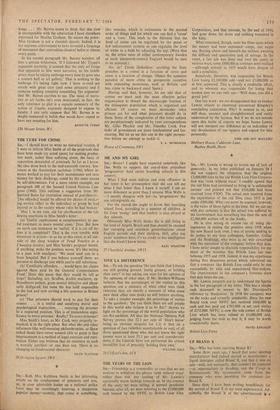SIR,—Mr. Lawrie is wrong to accuse me of lack of
generosity. In my letter published on January 24 I did not support the allegation that the original £3,000,000 loan to the old British Lion Film Corpora- tion was 'sunk without trace.' I readily agreed that the old films had continued to bring in 'a substantial income' and pointed out that £316,600 had been received from FIDO. The actual sum received from the exploitation of the old films since 1955 is just under £900,000. What can never be assessed, however, is the value of these rights at the time. All we can say with any certainty is that the actual loss suffered by the Government was something less than the sum of £2,969,000 written off in the books.
He is also wrong to accuse me of being dis- ingenuous in stating the position since 1958 when the new Board took over. I was of course seeking to do justice to my four colleagues, Launder, Gilliat and the Boultings, who were in no way concerned with the operation of the company before that date. I have never sought to disclaim responsibility for my share of the troubles that British Lion ran into between 1955 and 1958. Indeed, it was my experience during that disastrous period which convinced me that a company like British Lion could only be run successfully by able and experienced film-makers. The improvement in the company's fortunes since that date bears me out.
Mr. Lawrie purports not to understand the figures in the last paragraph of my letter. This was a simple cash statement in answer to Mr. Davenport's reference to 'dissipation.' In 1958 the company was on the rocks and virtually unsaleable. Since the new Board took over NFFC has received £660,000 in cash and has paid out £795,000—a net cash outlay of £135,000. NFFC is now the sole owner of British Lion which has been valued at £1,600,000 and. judging from the rush to buy it, it may be worth considerably more.






































 Previous page
Previous page